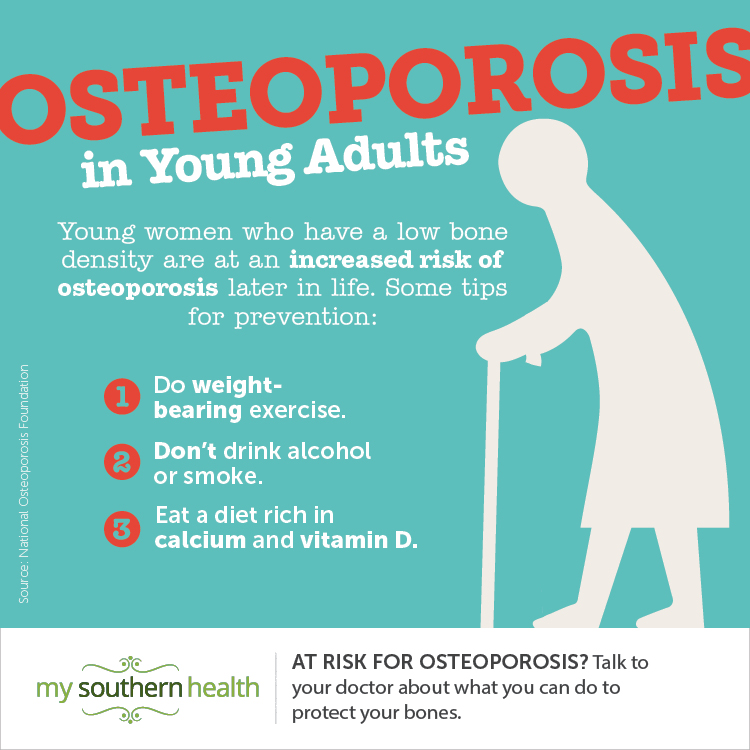We know our bones weaken as we age, but, surprisingly, this condition can affect young adults, too.
Of the estimated 10 million Americans with osteoporosis, about 80 percent are women. And while we usually relate osteoporosis to older women, osteoporosis in young adults can still occur. It can also be preventable. Thinking when you’re younger about the condition, in which bones become weak and brittle, can mean taking preventive steps to protect your bone health down the road.
According to the National Osteoporosis Foundation, though only rarely the case, “premenopausal” women in their 20s, 30s and 40s can be affected. “Some young women have low bone density, which increases their chance of getting osteoporosis later in life,” according to the foundation, which also notes that an underlying medical condition or medicine — secondary osteoporosis — is often behind a premenopausal woman having osteoporosis. But sometimes premenopausal women have the condition for no known reason. This is called idiopathic osteoporosis.
So what can be done to help maintain bone health in young adults? Vanderbilt’s Osteoporosis Clinic Director Simpson Tanner IV, M.D., recommends the following tips to help your bones stay strong:
1. Do weight-bearing exercise. Just like your muscles, “Your bones respond to stress,” Tanner says. “Walking, running and jumping will help stimulate your skeletal system to grow and get strong.”
Studies show that young women who participate in athletics have the highest bone density. They also show that postmenopausal women who take part in regular exercise can prevent or reverse bone loss by almost 1 percent a year. And weight-bearing doesn’t necessarily mean hitting the gym; simply walking regularly will help.
But the benefits don’t stop there. “Muscles are a great cushion,” Tanner says. “If you fall they distribute the force away from the bone, so you’re less likely to have a fracture.”
2. Eat a diet rich in calcium and vitamin D. “You’re constantly remodeling and updating your skeleton,” Tanner says. And in your late 20s, 30s and 40s, about 10 percent of your bone mass regenerates. That’s why these two nutrients are crucial.
Adults (men and women) under age 50 need 1,000 milligrams (mg) of calcium each day.
- All women over age 50 should get 1,200 mg of calcium daily.
- Men ages 51 to 70 should get 1,000 mg of calcium a day and 1,200 mg after they reach age 70.
- Men and women under age 70 need 600 international units (IU) of vitamin D daily. That increases to 800 IU of vitamin D after age 70.
3. Don’t smoke or drink more than 3 alcoholic beverages a day. The more you smoke and the longer you smoke, the greater risk you have of fracture in old age. Similarly, increased alcohol consumption correlates with higher fracture risk, Tanner says.
4. Get a DEXA scan. The dual-energy x-ray absorptiometry — or bone density — scan is a must-do for post-menopausal women or those on bone-compromising medications, Tanner says. “A DEXA scan will tell you how thin and thick your bones are and can help translate that into your risk of a fracture in the future,” he explains.
Wondering how to get your daily dose of calcium and vitamin D? This infographic will show you food recommendations on how to get all your vitamins and nutrients.

